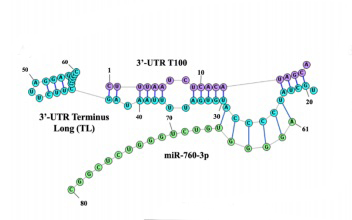Scientists From Duquesne University Uncover The Intriguing Interplay Between Host microRNAs And The SARS-CoV-2 Viral Genome 3’-Untranslated Region
COVID-19 News - Host microRNAs - 3’-Untranslated Region May 25, 2023 2 years, 7 months, 3 weeks, 3 hours, 50 minutes ago
COVID-19 News: The COVID-19 pandemic caused by the SARS-CoV-2 coronavirus has challenged the world for over three years. While scientific advancements have led to the development of vaccines and antiviral drugs, many mysteries surrounding the virus's interactions with the host remain unsolved.

Understanding the molecular mechanisms behind disease severity, immune evasion, and viral replication is crucial for combating this global threat. A new study by scientists from Duquesne University, Pittsburgh, Pennsylvania-USA has shed light on the potential interactions between host cellular microRNAs (miRNAs) and the SARS-CoV-2 viral genome's 3'-untranslated region (UTR). These findings provide valuable insights into the virus-host interface and may pave the way for novel antiviral treatments.
Exploring the SARS-CoV-2 Genome and Host miRNA Interactions
The SARS-CoV-2 genome consists of conserved elements, including the 5'- and 3'-UTRs, which play essential roles in viral replication. Secondary structures within these regions have drawn attention as potential targets for host miRNA interactions. Viruses often exploit host miRNAs for their own benefit, and computational analysis has revealed numerous potential binding sites for host miRNAs within the SARS-CoV-2 genome.
Specifically, miR-760-3p, miR-34a-5p, and miR-34b-5p have been identified as potential miRNAs involved in regulating the translation of interleukin-6 (IL-6), the IL-6 receptor (IL-6R), and progranulin (PGRN), which are crucial proteins involved in the host immune response and inflammatory pathways.
Unraveling the Molecular Interactions
To investigate the binding interactions between these miRNAs and the SARS-CoV-2 genome 3'-UTR, the study team employed native gel electrophoresis and steady-state fluorescence spectroscopy.
The study findings confirmed the specific binding of miR-760-3p, miR-34a-5p, and miR-34b-5p to their predicted sites within the viral genome. These findings suggest that the virus may exploit these miRNAs to manipulate the host immune response and potentially enhance viral replication. Additionally, researchers explored the use of 2'-fluoro-D-arabinonucleic acid (FANA) analogs of these miRNAs as competitive inhibitors to disrupt the binding interactions, opening new avenues for therapeutic interventions.
Implications for Antiviral Treatments and Understanding Immune Dysregulation
The mechanisms uncovered in this study offer promising prospects for the development of antiviral treatments against SARS-CoV-2 infection. By targeting the interactions between host miRNAs and the viral genome, researchers may be able to disrupt the virus's ability to manipulate host immune functions.
Moreover, these findings provide a potential molecular basis for cytokine release syndrome (CRS) and immune evasion observed in severe COVID-19 cases. Dysregulation of miR-760-3p, miR-34a-5p, and miR-34b-5p, which regulate IL-6, IL-6R, and PGRN, may contribute to the initiation and progression of the cytokine storm associated with severe disease. Understanding these mechanisms could lead to strategies for controlling the uncontrolled inflammation and mitigating the severe consequences of COVID-19.
A previous study covered in
our
COVID-19 News articles showed that the SARS-CoV-2 UTRs intrudes on the human host RBPs RNA binding proteins) and modulates cellular splicing, leading to altered gene regulation.
https://www.thailandmedical.news/news/sars-cov-2-research-scientists-uncover-that-sars-cov-2-utr-s-intrudes-host-rbp-s-and-modulates-cellular-splicing-leading-to-altered-gene-regulation
Conclusion
The interplay between host miRNAs and the SARS-CoV-2 viral genome presents captivating molecular dynamics. Investigating the binding patterns and functional consequences of these interactions can provide valuable insights into viral pathogenesis and host immune response. By modulating the expression of key host genes and viral proteins, miRNAs have the potential to influence viral replication, viral evasion of immune responses, and host antiviral defense mechanisms.
Additionally, the dysregulation of miRNA expression patterns has been observed in various diseases, including viral infections and cancer. Therefore, studying the miRNA landscape in COVID-19 patients can provide valuable diagnostic and prognostic markers. MiRNAs have the potential to serve as non-invasive biomarkers for disease severity, treatment response, and long-term outcomes.
Despite the significant progress made in understanding the interplay between miRNAs and SARS-CoV-2, there are several challenges and avenues for future research. The dynamic nature of miRNA expression and their pleiotropic effects necessitate comprehensive and longitudinal studies to capture the temporal dynamics of miRNA-mediated regulation during different stages of infection.
Furthermore, identifying the specific targets of viral and host miRNAs and unraveling the functional consequences of their interactions will provide a more detailed understanding of the underlying mechanisms.
Continued research in this field has the potential to improve patient outcomes and inform strategies for managing future viral outbreaks.
The study findings were published on a preprint server and are currently being peer reviewed.
https://www.biorxiv.org/content/10.1101/2023.05.18.541401v1
For the latest
COVID-19 News, keep on logging to Thailand Medical News.
